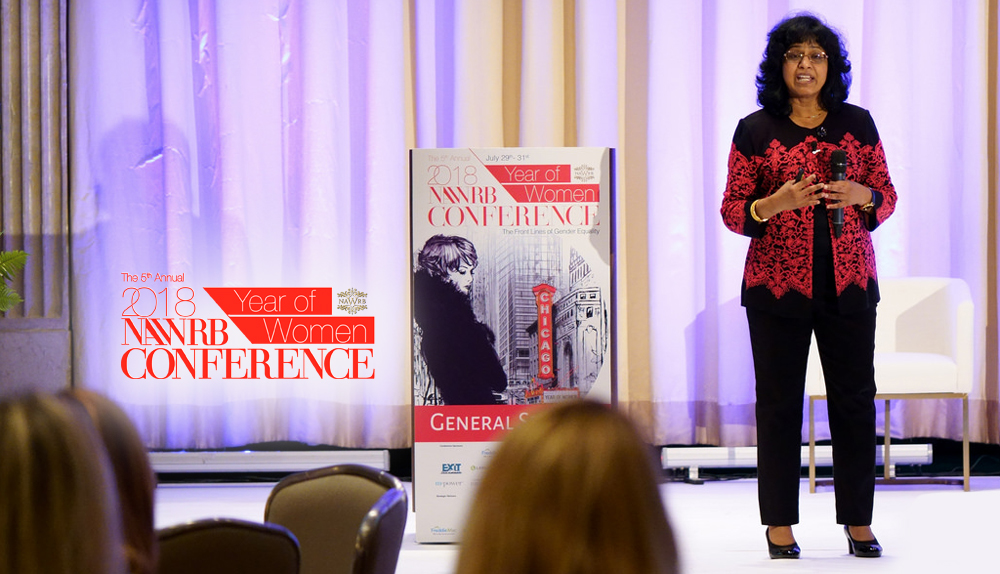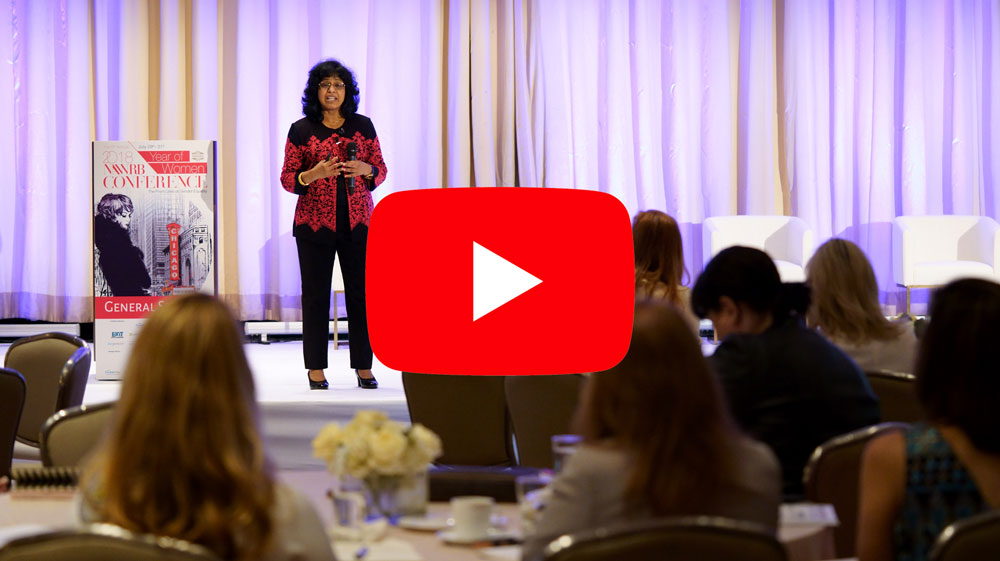Dr. Chitra Dorai, AI Scientist, Entrepreneur and Former IBM Fellow and CTO at IBM Global Services, took the stage after Sharron Levine, Director of the Office of Minority and Women Inclusion (OMWI) at the Federal Housing Finance Agency (FHFA), to give her presentation on Technology Human Balance ™ during the SHETalk series at the 2018 NAWRB Conference.
Continuing advances in digital technologies have profoundly altered the way how people and businesses interact today. These digital forces are leading to a disruptive “rethink” of the way people live, engage, and work. AI systems from Siri and Alexa to Watson are remaking our personal and professional lives from information access to how we make decisions. To succeed in this increasingly disruptive environment, organizations everywhere are digitizing their operating models to offer new experiences, scale human expertise and devise new ways to work.
A thought leader in Artificial Intelligence (AI) , and recent winner of the 2018 NAWRB Roaring Thirty The Innovator Award, Dr. Chitra Dorai offered the perfect introduction to NAWRB’s Technology Human Balance™, NAWRB’s new thematic focus on how technology is disrupting the housing and real estate ecosystem, as well as in our daily lives, and how we can properly leverage this dynamic tool in the way we live and work.
Dr. Chitra Dorai began educating the audience about current technological advancements with the “ABC’s of Modern Technology” —Artificial Intelligence (AI), Blockchain and Cloud— followed by how we should responsibly use AI in our workforce while also ensuring our own human agency. First, she began by giving an overview of the three patterns of AI usage, including Discovery (AI creating new insights), Decision (AI providing bias-free advice) and Engagement (AI interacting and assisting through understanding and reasoning).
While we commonly interact with AI in the form of chatbots and smart home technology (e.g., Siri or Alexa), it will become a common helper in the real estate finance industry, such as communicating with buyers in an intelligible manner and identifying important signals for regulations through RegTech.
She reveals that current technology has created AI that can even make haircut appointments on behalf of its owner. The example she shared showed an AI that understands and speaks almost identical to the way a human young woman would sound like, including familiar speech patterns and mannerisms such as saying “Mhmm” as an affirmation.
In closing, she addressed where she believes we are headed in terms of AI. We are seeing new frontiers of automation, which includes robotic process automation and intelligent process automation in addition to basic automation that can do processing transactions. Many fear that AI will take over our jobs, worry that the creators of AI will intentionally (or unintentionally) include their own biases into new technology, causing more roadblocks and harm to minorities, or even present a threat to the human species.
Before we begin worrying about living among humanoid “Replicants” as in the film Blade Runner, she notes that we have “Nothing to fear as in now. Maybe not even in 10 years. We have a way to come before we are all going to see an AI system that is going to exhibit consciousness like you and me.”
Avoiding potential problems with AI will involve a balancing act of purpose, transparency and trust. We must create purposeful technology, be transparent about the use of AI, and have trust AI will be utilized efficiently and ethically.
“You have on one hand people raising fear that technology advances cannot be stopped, a relentlessly moving forward frontier. What we can do is, surrounded with the right policies and right programs, make sure that the AI technology is put in the right hands and used in a right manner.”
She states this is something we should demand as vendors, suppliers and customers. While experts in technology will continue to develop AI to heightened intelligence and abilities, others will simultaneously do work to analyze the ethics and implications of this new tool.
Dr. Chitra Dorai is optimistic that AI is a tool that can improve our lives and should be perceived as a partner in our tasks: “AI systems in partnership with human beings are going to present options so we human beings can take better positions and do our work more successfully.” The choice is ultimately up to us.
The NAWRB Diversity & Inclusion Leadership Council (NDILC), comprised of senior executive women dedicated to raising the number of women leaders and growing women’s employment and empowerment at all levels in the housing ecosystem, has recently welcomed Dr. Chitra Dorai as a distinguished Council Member.
She is also our featured sheCENTER(FOLD) in NAWRB Magazine, Volume 7, Issue 2, The Strength of Business Ownership, where she shares her journey growing up in Chennai, India to traveling to the United States to realize her aspirations, ultimately earning IBM’s highest honor and helping thousands of homeowners during the financial crisis.

 Login
Login


